

How Dresden has recovered to become a German cultural centre in pictures. Allied Forces dropped 3,900 tonnes of explosives over Dresden during four raids on 13th-15th February 1945The bombings on the east German city destroyed 1,600 acres of its centre, killing an estimated 25,000 peopleThe resulting firestorm that engulfed the city centre is said to have reached temperatures of over 1,500C By Sara Malm for MailOnline Published: 21:43 GMT, 12 February 2015 | Updated: 00:06 GMT, 13 February 2015 These images show the blossoming of Dresden in east Germany from the ruins of the Allied bombings towards the end of World War II.
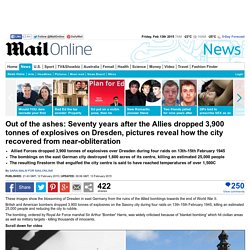
British and American bombers dropped 3,900 tonnes of explosives on the Saxony city during four raids on 13th-15th February 1945, killing an estimated 25,000 people and reducing the city to rubble. The bombing, ordered by Royal Air Force marshal Sir Arthur 'Bomber' Harris, was widely criticised because of 'blanket bombing' which hit civilian areas as well as military targets - killing thousands of innocents. Scroll down for video. The 10 greatest controversies of Winston Churchill's career. Image copyright Getty Images The UK is marking the 50th anniversary of the death of Winston Churchill.

He is regarded by many as the greatest Briton ever, but for some he remains an intensely controversial figure. During Britain's darkest hours in World War Two, Churchill's leadership was vital in maintaining morale and leading the country to eventual victory over Nazi Germany. In 2002 Churchill saw off the likes of Shakespeare, Darwin and Brunel to be voted the greatest ever Briton. But in a career spanning some 70 years, he had more than a few moments of controversy. "There's a danger in Churchill gaining a purely iconic status because that actually takes away from his humanity," says Allen Packwood, director of the Churchill Archives Centre.
"He is this incredibly complex, contradictory and larger-than-life human being and he wrestled with these contradictions during his lifetime. " Here are 10 of the most common debates that have raged about Churchill's legacy. Image copyright PA 1. 2. 3. “The Creeds of the Devil”: Churchill between the Two Totalitarianisms, 1917-1945. By Antoine Capet Abstract: Contrary to much of the literature that depicts him first and foremost as a lifelong foe of communism, Winston Churchill was actually quite pragmatic regarding his opposition to various forms of totalitarianism, a worldview which explains his near-rabid anti-communism following the First World War and also his gradually softening change as he began to see fascist Nazi Germany as the greatest threat to a stable world order in the years before the Second World War.
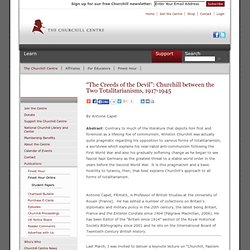
It is this pragmatism and a basic hostility to tyranny, then, that best explains Churchill’s approach to all forms of totalitarianism. Antoine Capet, FRHistS, is Professor of British Studies at the University of Rouen (France). Www.astorcollege.org/images/stories/lzones/language/documents/churchill_revision_notes.pdf. Churchill Archive - Lesson Plans. Lesson Plan 1: The ‘Iron Curtain’ Speech This lesson plan, written by Jannette Milligan (pictured), introduces the major issues of the Cold War through a speech given by Winston S.

Churchill in 1946, and shows a leader using his awareness of history to determine future policy. The lesson plan includes an edited version of the speech at Fulton, Missouri, an annotated version for teacher use, further background on major events leading up to the speech, and suggestions for teaching the speech in class. Use the ‘Iron Curtain’ Speech Lesson Plan Lesson Plan 2: 'Defence of Freedom and Peace' Speech This lesson, written by Bev Hart and Eileen Bach (pictured), enables teachers to help students understand the “gathering storm” in Europe.
The Churchill Era: An Educational Resource. An insight into some of the great events that shaped the modern world, beginning with the cataclysmic upheaval of World War I and now going on to the build up to World War II.
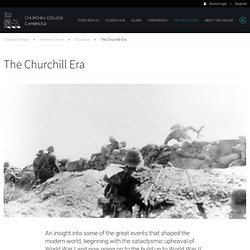
Although the following materials should have something for anyone with an interest in the history of the last century, it has been chiefly designed with exercises for use by schools in England and Wales, and relates to the GCE history curriculum for A' and AS level. If you would like to explore our collections further, many of our catalogues are available online, while we also have a useful guide on using original sources. All materials may be freely copied for use in schools. Churchill and Gandhi, by Arthur Herman. A Bantam Book, May 2008 The following are selected snippets rather than a full representation of Herman's book.
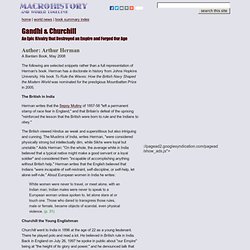
Herman has a doctorate in history from Johns Hopkins University. Winston Churchill - Biography. The Right Honourable Sir Winston Leonard Spencer Churchill (1874-1965), the son of Lord Randolph Churchill and his American wife Jennie Jerome, was educated at Harrow and Sandhurst.
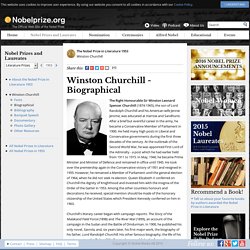
The castaway who annoyed Churchill. 26 January 2012Last updated at 10:42 By Alex Hudson BBC News The first ever castaway on Desert Island Discs 70 years ago was a man who not only annoyed Winston Churchill but also earned Adolf Hitler's enmity.
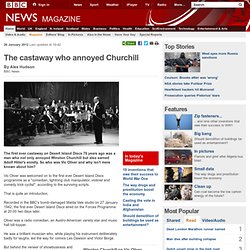
So who was Vic Oliver and why isn't more known about him? Vic Oliver was welcomed on to the first ever Desert Island Discs programme as a "comedian, lightning club manipulator, violinist and comedy trick cyclist", according to the surviving scripts. That is quite an introduction. Recorded in the BBC's bomb-damaged Maida Vale studio on 27 January 1942, the first ever Desert Island Discs aired on the Forces Programme at 20:00 two days later.
Oliver was a radio comedian, an Austro-American variety star and music hall bill-topper. Churchill: A Study in Greatness - Geoffrey Best. Churchill. Bolshevism And Imperial Sedition. November 4, 1920.
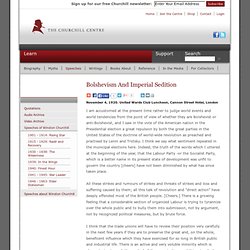
United Wards Club Luncheon, Cannon Street Hotel, London. Selected Speeches of Winston Churchill. Archive - Remembering Winston Churchill - Tributes to a legendary statesman and a wartime hero.